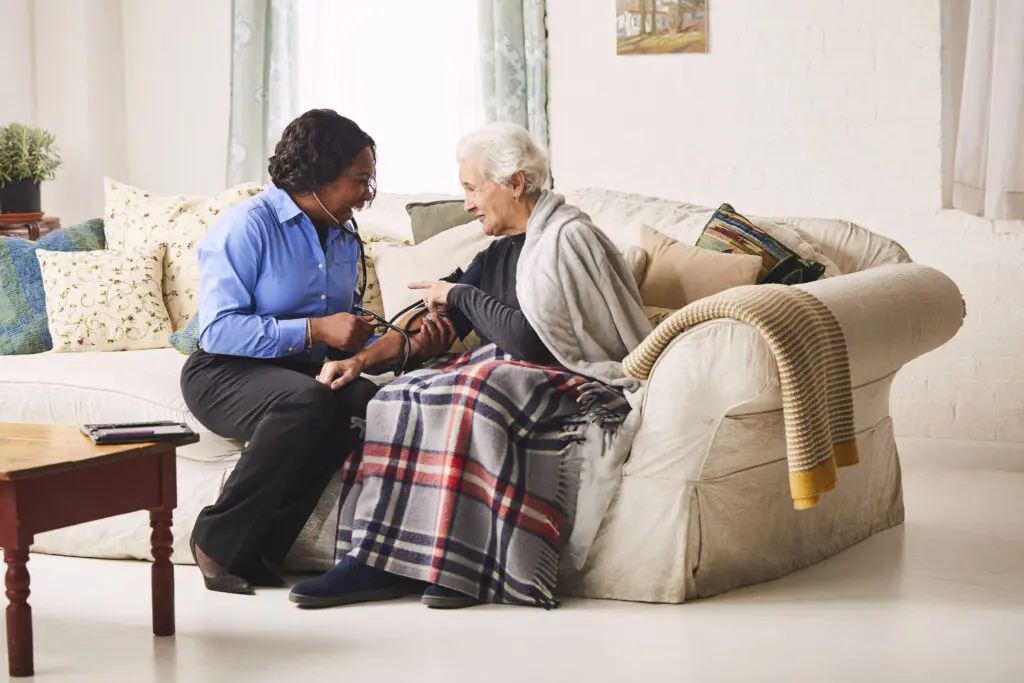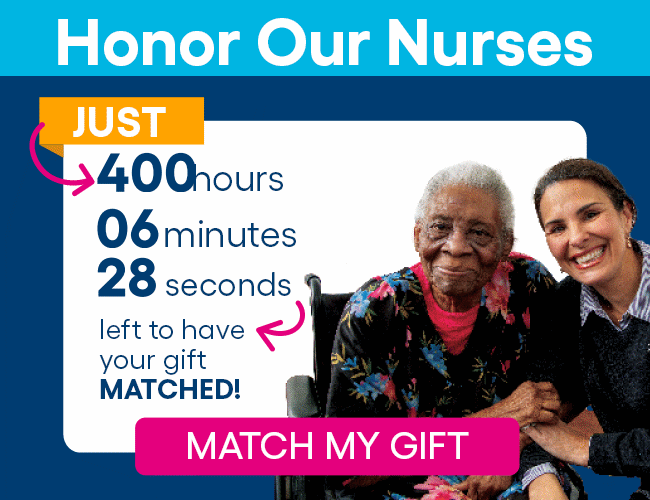
A loved one’s diagnosis with Alzheimer’s disease or another type of dementia can bring up a lot of questions. What can your loved one do on their own? Is it safe for them to live at home? How will you know when they need additional care?
As the disease progresses, your loved one will change — and your role as a caregiver will change too. This guide can help you understand those changes and gives you information about what you can do, and how VNS Health can support you and your family.
What Is Dementia?
Dementia is not a disease itself. It describes symptoms of diseases that cause changes in the brain. These changes affect a person’s ability to think, speak, and solve problems. These changes also cause memory loss. Diseases like high blood pressure or Parkinson’s don’t affect the brain. They can still cause memory loss or dementia.
What Isn’t Dementia?
Some types of memory loss are not caused by disease. Concussion, “chemo brain,” traumatic brain injury, and even some medications can cause symptoms that look like dementia.
It’s normal to forget things as you get older. Age-related memory loss is misplacing your keys and having to retrace your steps to find them. It’s having a word on the tip of your tongue, or remembering a meeting or appointment after it’s started.
Mild cognitive impairment (MCI) affects memory and thinking. Cognitive impairment describes having trouble remembering, problem-solving, making decisions, or following a conversation. MCI causes changes that are noticeable, but you can still live on your own and take care of yourself.
Some people with MCI develop Alzheimer’s disease or another dementia. In other people, the memory loss doesn’t get worse. When it’s caused by an injury or a medication, MCI can go away as you recover or take a new med.
Stages, Symptoms, and Tips for Care
Most types of dementia are progressive — that is, they get worse over time. The diseases may have different stages, but these are often categorized as mild or early-stage dementia, moderate or middle-stage dementia, and severe or late-stage dementia.
Caring for a Loved One with Mild Dementia
Mild dementia is the first and least severe stage of dementia. This is when you begin to see changes that can affect everyday life.
Memory problems start to affect daily routine. In this stage, your loved one may:
- Still remember names and faces, but consistently forget information that they just learned
- Lose things, then find them in weird places (keys in a bathroom cabinet, phone in the refrigerator)
- Forget recent events, even with reminders
Your loved one may be scared or angry about their diagnosis:
- They may lash out at you
- They may accuse you of trying to fool them (when they don’t remember events)
- They may have trouble concentrating or following conversations and become withdrawn
- They may become confused when trying to get to familiar places
- They may have trouble following plots of movies or remembering things they just heard or read
At this stage, your loved one is still able to live on their own. A local family member or friend may need to check in to make sure:
- Laundry is done and there are clean clothes
- Bills are paid
- Foods haven’t expired or spoiled
- Look into respite care or part-time help so you can take breaks to recharge. You may want to begin home care if you’re overwhelmed.
- Talk about advance care planning while your loved one can still make decisions. Make sure will and other docs are up to date.
- Get information. Dementia is unpredictable, but knowing what to expect can help you feel more in control.
- Establish a routine and ways to help your loved one remember as much as they can on their own — write down appointments and events, or answers to frequent questions.
- Respite care allows you to take breaks, go to appointments, or attend family events.
- Dementia Care at Home can give guidance and education, provide home health aides with specialized training who can keep your loved one occupied with appropriate activities and monitor for wandering, and help you and your family know what to expect longer term.
Caring for a Loved One with Moderate Dementia
Moderate dementia is often the longest stage. As their disease gets worse, your loved one may struggle with daily tasks and require more attention and care.
Memory problems increase. In this stage, your loved one may:
- Forget names of people they know well but see occasionally
- Have trouble remembering personal details like their own address or phone number
- Repeat questions and stories during conversations
As your loved one’s thinking processes decline, you may notice they have:
- Difficulty making decisions or executing simpler tasks (milk first, then cereal)
- Wandering
- Hallucinations (sensing something that isn’t there, like hearing voices or seeing visions)
- Sundowning (increased confusion and irritability in late afternoon)
Your loved one may still be able to live alone in the earlier stages of moderate dementia. Your loved one can still use the bathroom, eat, bathe, and get dressed on their own, but eventually they may need more frequent help with:
- Remembering to bathe or eat, or with picking out clothes
- Taking medications
- Safety — they may forget to turn off the stove, for example, or wear warm clothes in winter
- If you haven’t already started, begin researching full-time help options
- Learn techniques to manage frustration in communicating
- Take steps to make your loved one’s home safer
- You may not be able to prevent wandering, so have your loved one wear an ID or medical bracelet
Dementia Care at Home is a program that supports people with dementia and their caregivers. It provides specially-trained aides as well as ongoing support and information for caregivers.
VNS Health is here for you, every step of the way, with the information, education, support, and dementia home care services.
Caring for Someone with Late-Stage Dementia
The final stage of dementia can be broken down into “moderately severe” and “severe.”
Moderately Severe Dementia
Moderately severe dementia is when your loved one may have trouble remembering who you, as the caregiver, are. They may not remember recent conversations or events at all.
Your loved one may:
- Forget names of familiar people, usually in reverse chronological order (that is, they forget grandchildren, then children, then spouse or partner, and finally siblings and parents)
- Be unable to remember recent events but still remember events from childhood
- Have trouble with conversations, as they forget more and more words
At this stage, you may notice:
- Hallucinations become more frequent
- Outbursts and accusations
- As they have trouble communicating, they may become increasingly withdrawn
Your loved one will likely need daily help:
- With tasks like getting dressed and using the bathroom
- Staying safe — falling becomes a risk as they lose coordination
Severe Dementia
Severe dementia is the last stage. Your loved one will most likely require 24/7 care because they can no longer complete daily tasks on their own and can’t respond to their surroundings.
- May not remember anyone’s name, but they still know familiar faces and voices, and touch
- May forget how to speak (words, word order)
- Eventually, they will forget how to swallow
You may not be able to tell if they know when you’re with them
At this stage, a person needs help with everything. They are unable to sit without support, go to the bathroom, or eat without help.
As caring becomes more difficult, you may want to look into a memory care facility. Eventually, hospice care may be the right choice.
Hospice care focuses on easing symptoms, making your loved one comfortable, and giving you additional caregiver support. VNS Health can provide hospice care in a family home, a nursing home, or memory care unit.
If you are considering hospice, remember that it is not round-the-clock care. However, you may be able to get full-time help with private pay or certain private long-term care plans.
Learn more about hospice for people with dementia.
Resources
Caring for someone with dementia is hard! Our health library has information about managing stress, as well as tips you can use as a dementia caregiver.

